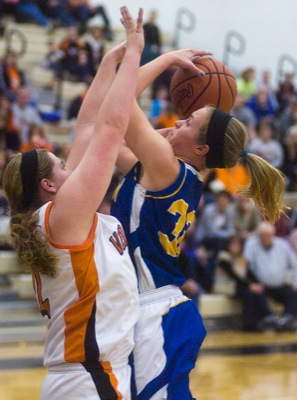Friday, January 25th, 2013
New federal school law already in play
By Shelley Grieshop
The U.S. Department of Education says students with disabilities must be given a fair shot to play on traditional sports teams or have their own leagues.
Local education officials say the mandate isn't new to them.
"My first thought is ... this isn't necessary. We're already doing this," said Diana Spencer, director of special education for the Mercer County Educational Service Center. "Every IEP (individualized education program) statement we have addresses the fact that every student has the same opportunity as their peers to be on a team."
The Department of Education announced today that disabled students who want to play for their school can join traditional teams if officials make "reasonable modifications" to accommodate them. If those adjustments would fundamentally alter a sport or give the student an advantage, schools must create parallel athletic programs with comparable standing to traditional programs.
"Sports can provide invaluable lessons in discipline, selflessness, passion and courage, and this guidance will help schools ensure that students with disabilities have an equal opportunity to benefit from the life lessons they can learn on the playing field or on the court," U.S. Secretary of Education Arne Duncan said in a statement earlier today.
Spencer, who oversees the education of special needs students at several Grand Lake area schools, said districts already go "above and beyond" to allow special needs children to participate in sports, band and other activities.
But there has to be limits, she said.
"For example, if a student with multiple handicaps wants to be on the football team, I think the school would be very accommodating but safety is an issue," she said.
In such a situation, the student's family and the school might work out a modified plan that allows the child to participate from the sidelines, Spencer explained. Costs for most accommodations are usually minimal such as the use of a lift bus for transportation, she said.
Local special needs athletes already have programs that allow them to participate with other athletes with disabilities such as Special Olympics and Challenger leagues.
Marion Local schools previously had a special needs student on its girls basketball team.
"It was a very positive experience for the young lady," school superintendent Mike Pohlman said.
The district made very few accommodations, he said. The head coach and teammates "were her aides," he explained.
Pohlman said he realizes some circumstances could be costly to a district. But that's not new either, he said. The government routinely makes demands on schools without providing money, he said.
"Like always ... it's an unfunded mandate ... and the expense would fall on the local taxpayers," he said.
Pohlman said the Marion Local district has and always will incorporate special needs students in all activities.
"We're living proof it's done every day," he said.
The groundbreaking order is reminiscent of the Title IX expansion of athletic opportunities for girls and women four decades ago and could bring sweeping changes to school budgets and locker rooms for years to come.
Activists cheered the changes.
"This is a landmark moment for students with disabilities. This will do for students with disabilities what Title IX did for women," said Terri Lakowski, who for a decade led a coalition pushing for the changes. "This is a huge victory."
It's not clear whether the new guidelines will spark a sudden uptick in sports participation. There was a big increase in female participation in sports after Title IX guidance instructed schools to treat female athletics on par with male teams. That led many schools to cut some men's teams, arguing that it was necessary to be able to pay for women's teams.
Education Department officials emphasized they did not intend to change sports traditions dramatically or guarantee students with disabilities a spot on competitive teams. Instead, they insisted schools may not exclude students based on their disabilities if they can keep up with their classmates.
Federal laws, including the 1973 Rehabilitation Act and the Individuals With Disabilities Education Act, require states to provide a free public education to all students and prohibit schools that receive federal money from discriminating against students with disabilities. Going further, the new directive from the Education Department's civil rights division explicitly tells schools and colleges that access to interscholastic, intramural and intercollegiate athletics is a right.
The department suggests minor accommodations to incorporate students with disabilities onto sports teams. For instance, track and field officials could use a visual cue for a deaf runner to begin a race.
Increasingly, those with disabilities are finding spots on their schools' teams.
"I heard about some of the other people who joined their track teams in other states. I wanted to try to do that," said Casey Followay, 15, of Wooster, Ohio, who competes on his high school track team in a racing wheelchair.
Some cautioned that progress would come in fits and starts initially.
- The Associated Press contributed to this story.




